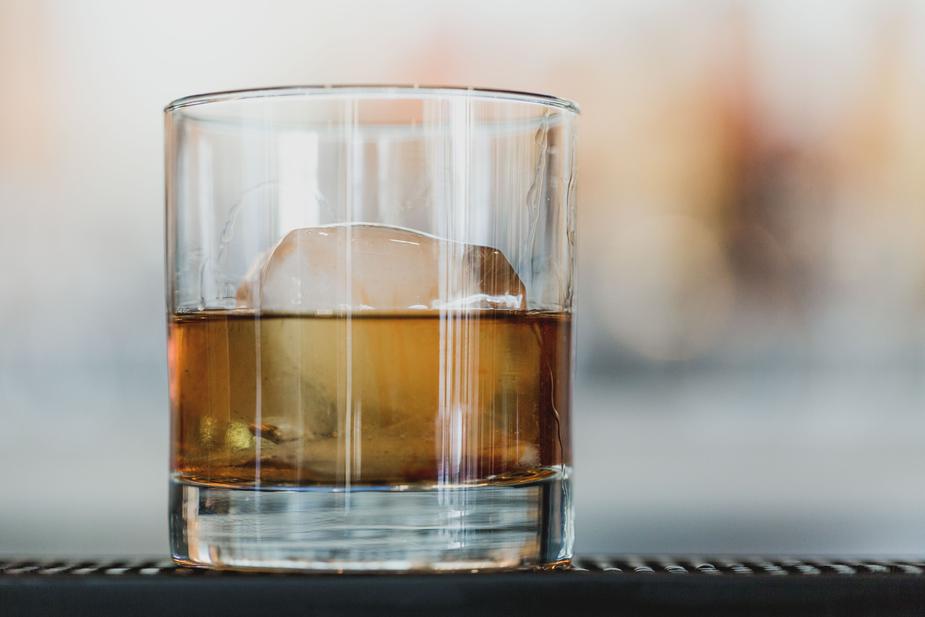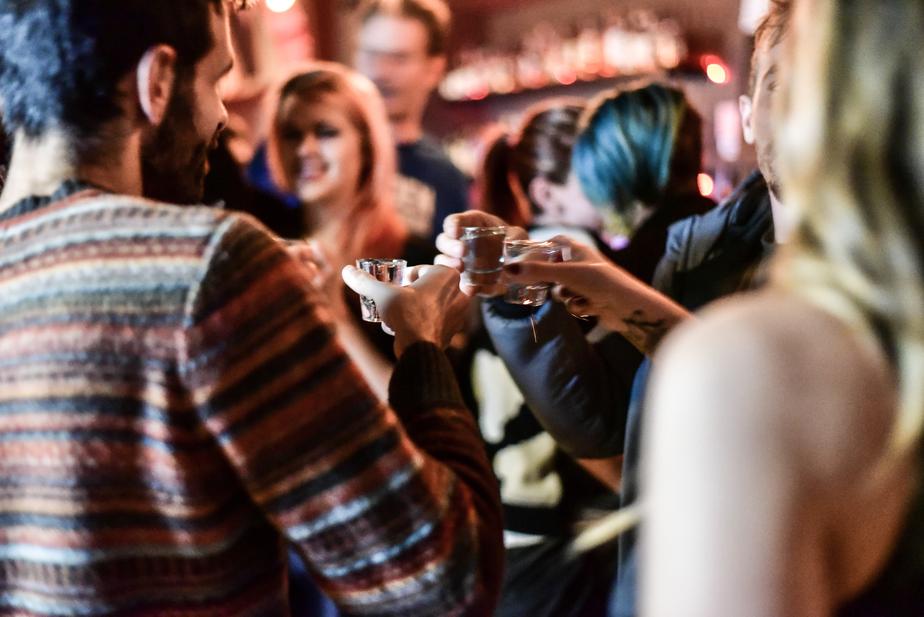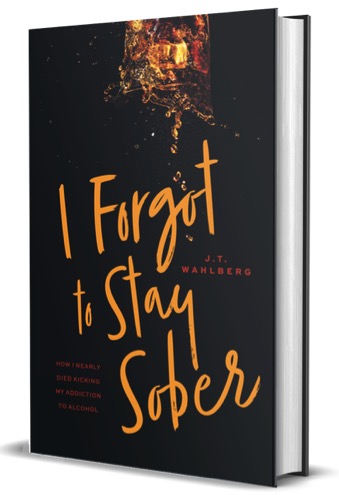Preface by Rick Green,
Does Attention Deficit Disorder (ADHD or ADD) increase your risk of Alcohol Abuse and Substance Use Disorder (SUD)?
“Various studies have reported an elevated comorbidity of ADHD and SUD (Substance Use Disorder) in 45% to 70%. Biederman and colleagues found a higher rate (44%) of comorbid alcohol abuse/addiction in 239 adult ADHD patients, in contrast to 268 non-ADHD adults with a comorbid alcohol abuse/addiction of 24%.”
“In general, ADHD patients are said to have twice as high a lifetime risk of developing a Substance Use Disorder.” (Source and study links)
In my teens, alcohol and drugs scared me. But then, to be honest, pretty much everything scared me. Long before my ADHD diagnosis, watching friends getting repeatedly stoned and hammered, I somehow sensed that doing anything in ‘moderation’ was not my forte. A rare example of self-awareness. And luck.
Our friend J.T. Wahlberg was not so lucky. He didn’t foresee where a drink or two might lead. Now, a published author, J.T. Wahlberg shares an honest account of his journey. It’s a tough read, but with a happy ending. I’m so glad that J.T. made it, despite sinking to near death, and has found the courage to share his story with others!

Dying to Get Sober
By J.T. Wahlberg,
There was only one way to slow down my brain: get drunk, get numb, get dumb. This happened all day every day.
Self-medication was the key for me. I was completely in control, until I wasn’t. As a young adult I struggled with keeping my thoughts from getting out of control.
My brain was moving way too fast. This made me feel different than everyone else, all I wanted to do was fit in. Alcohol and drinking lots of it slowed my brain right down, and this suited me just fine.
I did not want to be drunk, numb and dumb all the time. There was just no other way that I knew to deal with my thoughts, to feel my feelings, yet not live in my emotions.
The conditioning started early and often. I was a young boy mixing drinks, and getting beers for the adults at family parties.
I enjoyed being of service, it made me feel special to bring them drinks and watch them get louder and more red in the face as the night went on.
Anxious to be like the adults I could not wait to start drinking. I got proper drunk for the first time at 13. It would be a couple more years before I realized that alcohol would slow down my overactive brain.
Alcohol was constantly and consistently presented to me as being cool and sophisticated through the media. I wanted to be both, badly.
It was always well within my power to choose not to drink, or to drink in moderation, or not at all. There are plenty of folks who can have one drink, or no drinks and make it through life just fine. They have the ability to switch on or off their desire to consume alcohol. I broke that switch early on and never looked back.
That poor little switch did not stand a chance. The sheer volume of alcohol that I was drinking was too much for it. There was never a time that wasn’t a good time for a drink. I had convinced myself that any time was a good time for a drink.
Alcohol is Everywhere
Over time, I had forgotten to stay sober. It was a gradual descent into full-blown alcoholism.
There is no one event that took place where I can say, “This is when alcohol took over my life.” Alcohol was ever present in my life. My friends drank, my family drank, and I worked in the hospitality industry. There was nowhere I could go, or wanted to go, where alcohol would not be present, and readily available.
Alcohol advertising is insidious. According to the marketers of alcohol there is no down side. There is no mention of becoming so physically dependent on their product that when a person stops consuming it there is a good chance that they will die. That does not sell their product, that does not satisfy the bottom-line, their shareholders.
But even in the face of a multi-billion-dollar advertisement campaign espousing the benefits of alcohol, and never mentioning any of the negative effects I still had a choice. The fault lies entirely with me.
Consume alcohol or don’t. I chose to drink all the time.
All Negative, No Positive
It took nearly dying while kicking my addiction to alcohol to make me realize that alcohol is literal poison and extremely toxic. This fact does not apply to me only. One drink is poison, ten drinks is ten times the amount of poison. When I say aloud, “Alcohol is poison and it is not good for me.” It makes total sense when I am sober. When I was drunk and my ego was in charge, that sounded ridiculous. How could something that makes me feel so good be bad?
Numb and dumb was my preferred way to move through life. My entire life consisted of acquiring alcohol, drinking it, hiding it and ensuring that I always had enough for the next day. This was my self-medication routine, and it was exhausting.
I cringe when I think about how much time and effort I spent hiding my alcohol consumption alone. Never mind the amount of money I spent on booze.
Ego Was Not My Amigo
I came to sobriety in the worst possible way. I quit drinking cold. Withdrawing from alcohol incorrectly can actually kill you, who knew?
My ego would not allow me to admit that I had a problem with alcohol. Why would I have to research safe and effective methods of quitting alcohol if there was no problem? If I was “successfully” self-medicating with alcohol then I could quit. It was in fact a huge problem.
Quitting was the best-worst six days of my life. The best because I overcame my addiction to alcohol. The worst because I did it in such a way that it nearly killed me.
It was during those six days that I realized alcohol has no part in my life, and I had no control over my alcohol consumption. I was so thoroughly addicted to alcohol that when I quit drinking my body shut down.
Writing about this experience was important to me because I wanted to let folks know that there is a better way to get sober than the way I did. I made a huge mistake and it nearly cost me my life.
I want you to know: don’t try this at home kids. I also want you to know that it’s okay to check your ego and ask for help. Your family, friends, someone in your life, wants to and is willing to help you.
I write about my addiction as a cautionary tale about how easy it is to get addicted to alcohol, and withdrawing from alcohol incorrectly, can kill you. Make no mistake, alcohol is a drug, an extremely dangerous and normalized drug.

Relationships Are Tough
Everyone’s relationship to alcohol is different. I know that I can no longer have just one drink, while others can go their entire lives and never touch alcohol. Folks drink for all kinds of reasons: to celebrate, to mourn, because the baby won’t stop crying. Alcohol has intentionally become such a normal part of human existence. It is near impossible to watch a film or television show and not see the characters drinking.
Alcohol consumption is always glorified and never vilified. Even the most terrible hangovers in movies are spun into humorous situations. Nothing a glass of water and an Aspirin can’t fix. You can’t pick up a magazine or walk past a bus stop and not be subjected to an advertisement for alcohol.
Is it possible to avoid all scenes of alcohol consumption? Yes, if you never watch television or a movie ever again. Is this feasible? No, but what you can do is redefine your relationship with alcohol. Put booze in a box and throw away the key. Feel it in your bones that alcohol is quite literally poison (because science) and that you do not drink it. Say to yourself, “Alcohol is not good for me, and it has no place in my life.”
My hope is that people will re-evaluate their relationship to alcohol and do so in a safe and healthy way. If even one person was helped by sharing my experience then it was all worth it.
J.T. Wahlberg lives in Port Credit, Ontario, Canada, where he has “forgotten to drink alcohol” for six and a half years. He does not work a 12-step program nor did he go to a traditional rehab facility to get sober. He quit drinking in the most foolish way – cold, and it nearly killed him.
His book, I Forgot to Stay Sober was written to let folks know what to expect when they redefine their relationship with alcohol and J.T. hopes that this book will serve as a warning to readers that when it comes time to end their addiction, they should do so under medical supervision.
To get deeper into the discussion about how and why alcohol is so bad for you, J.T. recommends reading I Forgot to Stay Sober, and This Naked Mind by Annie Grace. If you feel like you have no one to turn to, send J.T. a note at hello@jtwahlberg.com or @jtwahlberg on Instagram, or and he will help you get the support you need.





This essay led me into a ‘what if?’ reverie and, Rick, if it is too much for the comment section, I understand if you can’t ok it to be read. It’s time for me to soak that greasy pan, I guess
****
Somehow, somewhere, J.T. found the belief that his life had value and was able to step off the cliff. I too am glad he survived the fall to the bottom and hope that others who are at that point of teetering over the precipice can be strengthened by the thought that there is help for them out there. It won’t make that first step any less terrifying but it may be the weight on the scale that tips one’s thoughts toward saving themselves and divorcing their addiction. I wish my cousin had known his true value.
We came to friendship later in life, as our age difference made that implausible in an earlier time. He was me in a male form. We took the same delight in the trivia of the universe, often noting the irony of our existence in that light. We were the two in the corner: cutting up at family funerals and not even trying to tone down the hilarity. He was a full-blown alcoholic and I was a recovering addict.
That was also about the time I was diagnosed with ADD. I was learning that all of those traits that I thought meant I was failing in life were really indicators of this bigger issue. The fact that I seemed to have a ‘use by’ date for relationships, that jobs came and went with alarming frequency, that it took me 10 years to earn a four year degree. . . His life seemed a mirror to my own.
I was slow to catch on. He would joke about being married four times, and twice to the same woman. He was unemployed at that time and spent most of his day with the Wall Street Journal, trying to spot the next Microsoft stock. He told me of his recent check of the breaker box in the basement of his mother’s house and how he found the interior decorated with cartoon stickers that he had applied when he was twelve, instead of doing homework. He told me his parents tried everything to help him focus on his school work and the desk in the basement, facing the wall, was one attempt. He laughed when he said ‘you can see how well that worked’. Aha. I got it then.
I had just started talking to him about my journey of self-discovery and releasing the blame I had assigned to myself when his mother called. She was worried. She hadn’t heard from him in two days, when his habit was to call every evening. I said I would check. It took four hours to convince the local police that he hadn’t ‘taken off with friends’ (he didn’t have any),that this couldn’t wait until morning, and that I would pay to have the locks replaced if they would just kick in the door. They finally took me at my word and called a locksmith.
There was no room for me on the landing. I stood at the bottom of the stairwell as they fiddled with the lock but when the door opened, they didn’t go in. The officer stayed where he was and called my cousin’s name, becoming louder and more urgent each time. Pussies. I had to push him out of the way to get inside and get to my cousin. He was alive but unconscious and glued to the floor with his own vomit. He opened his eyes while we waited for the ambulance and started to cry.
I wish I could say we got there in the nick of time, but we didn’t. The damage was done. It took him six months to speak and be understood and another year to learn to use a walker to get around. The only blessing I could find is that he didn’t seem able to dwell on his failings anymore. He couldn’t hold them in his memory long enough for them to get to him. He died about three years after overdosing on alcohol.
This recollection could have ended after the first paragraph, with the statement “I wish my cousin had known his true value”. Maybe it should have, but then this observation would not have the weight of my experience. It changed how I relate to people. There’s this question I carry with me now, and that comes into my consciousness if it looks like the answer may be ‘no’. It is ‘Do they know how important they are?”. The more obvious it seems that they do not, the more effort I need to put into showing them that they are. It could be the difference, going forward.